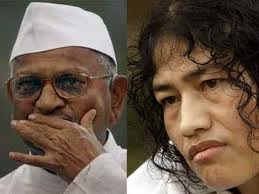आज मेरा रोम रोम चीख रहा है 
एरोम तुम्हारे लिए
चीख पुकार तो कब से दबी थी
गुस्सा भी चीख चीख के निकला था
vt स्टेशन पे तुम्हारी रिहाई की गुहार लगाकर
मानों तन और मनं ऐसा थरका था
लोगों को तुम्हारे बारे में बताना
लोगों को अफ्प्सा काले कानून के बारे में बता कर
मानो मनं कुछ तो हल्का हुआ था
लेकिन कुछ दिन से इस देश की गुहार देखकर 
अन्ना हजारे पर प्यार देख कर
देश के कोने कोने से भर्ष्टाचार के यह एक आवाज़ सुनकर
खुश तो हूँ,
पर मेरा दिल चीख चीख के रो रहा है
मेरा दिमाग, मेरा तन…. इस क्रांति पे खुश है
पर मेरा दिल मेरा साथ नहीं है
मेरा दिल तम्हारे पास है इरोम
वोह तुम्हारे लिए रो रहा है
वोह इस देश को समझ नहीं पा रहा है
आखिर एक दिल है……
तुम दस सालसे भी ज्यादा से भूख हड़ताल पे हो
तुम्हारे साथ एक भी भारतवासी नहीं आया
तुम AFSPA के काले कानून के खिलाफ हो
तुम्हें किसी ने नहीं अपनाया
किसी को मत बताना इरोम
यह एक ऐसी पहेली है
जिसका जवाब इंसानों के साथ बदलता हैं
हम अन्ना हजारे के साथ है
यह हमारी देश भक्ति है
हम अन्ना हजरे के साथ है
हम आम जनता के साथ है
जब हम तुम्हारे साथ है 
हम देशद्रोही है
जब तुम्हारे साथ हैं
हम फ़ौज और जवानों के खिलाफ है
हम इस देश की सुरक्षा के खिलाफ है
भ्रष्टाचार तो बचपन से हमें
हमारी किताबों में भी एक गलत चीज़ है बताया गया है
पर इरोम, देश भक्ति हमें
केवल अपने देश को बचाना ही सिखाएगी
देश, फ़ौज , पोलिस—देश भक्ति का अटूट अंग बन गए हैं
वह मेरी तुम्हरी लड़ाई में हमारे दुश्मन बन गए हैं
भ्रष्टाचार में लाखों करोड़ों के घपले हैं
पर अफ्प्सा , जैसे काले कानून के कारण
इस देश भक्ति के कारण
लाखों करोड़ों देशवासी मौत की नीद सो गए गए है
उनके मरने से उनके परिवार भी मर गए हैं
और हम सब उनको आतंकवादी के नाम देकर….
देशभक्ति का प्रमाण देकर कहीं सो गए
इरोम, हम सरकार की इस बर्बरता को
देशभक्ति के परदे में देख नहीं पाते
कब हमारे देश वासी जागेंगे
और हम देश वासी बाद में , पहले इंसान है
इस एहसास को जान पायेंगे
कब इरोम कब 
कब हजारों लाखों तुम्हारे साथ भी
भूख हड़ताल पे जायेंगे
कब इरोम कब
हमारे देशवासी
इस देशभक्ति का
मुखोटा हटाएँगे
अन्ना हजारे तुम्हारी जीत हो गयी है
तुम्हारे ८५ घंटों के अनशन से
लोकपाल बिल आएगा…….
इरोम शर्मीला के दशक के अनशन पे
AFPSA हटा नहीं है
अन्ना क्या आप इरोम के साथ बैठोगे ?
क्या आप कानून के नाम पर जो लहू बह रहा है ?
उसको रोक पाओगे ?
( This poem I wrote last year in april after the Anna illusion began )
English Translation
Today every pore of my body is screaming 
For you Irom
The screams were suppressed since when…
Anger was coming out in my screams and protests
As I was screaming and shouting for your release at VT station
My being had shaken within
To tell people about you, what you stand for
To tell people about draconian law AFPSA
I felt lighter
For the past few days the country has been screaming
I am happy to see
All the love being doled out to Anna Hazare
To hear voice against corruption
From nook and corner of each city
I am happy to see
But my heart is crying
My brain is happy thinking about this Anna revolution
But my heart is not with me
My heart is with you Irom
It is crying for you
And it is unable to understand the sentiments of this country
After all it’s a HEART
You have been on hunger strike for more than a decade
But not a single Indian came with you
You were against the black law of AFPSA
But no one owned you
Do not tell anyone Irom
This is a riddle
Whose answer changes with people?
If we are with Anna Hazare
We are true patriots
If we are with Anna Hazare
We are with the common people
When we are with you
We are traitors
When we are with you
We are against our army, our soldiers
We are against the national security
Corruption has been embedded as a bad trait
Since our childhood in our text books
But Irom, patriotism
Only teaches us to defend our country
Nation, army, police are inherent features of patriotism
They have become enemies in our fight for freedom
There have been many scams of crores under the banner of corruption
Because of AFSPA, BECAUSE OF THS PATRIOTISM
Lakhs and crores of Indians have been killed
Their families have also died eventually
And we have given them the certificate of terrorists
Very conveniently and gone to sleep in the bed of patriotism
Irom, we are unable to see the human rights violation of government
Under the garb of patriotism
When will my countrymen awaken, to the fact that
We are humans first, and Indians later
When Irom, when
Lakhs of people will join you in your hunger strike?
When Irom, when
Will our people remove the
Mask of patriotism?
Anna Hazare, you have won
After 85 hours of your FAST
The Lokpal Bill will be implemented
After a decade of your fast
Still the AFSPA has not been repealed
Anna will you sit with Irom?
Will you be able to stop the bloodshed
In the name of law?
Listen to my recitation at CGNET SWARA
Kabir Suman recites the Bangla Translation of my poem
Faking Democracy- Free Irom Sharmila Now
Related articles
- Day-long fast to highlight 12 years of struggle of #Irom Sharmila (kractivist.wordpress.com)
- #India- #Irom Sharmila completes 12 years of protest against AFSPA MANIPUR #draconianlaw (kractivist.wordpress.com)
- #India- Long Live The Iron Lady Of Manipur- #Irom Sharmila (kractivist.wordpress.com)
- ‘ #Irom Sharmila feels fasting is what she is meant to do in life’ (kractivist.wordpress.com)
- On eve of 12th anniversary of Sharmila’s fast, activists protest government apathy (kractivist.wordpress.com)
- #India- #Irom Sharmila refuses award (kractivist.wordpress.com)
- #Invitation -Repeal AFSPA Save Democracy – #Irom Sharmila (kractivist.wordpress.com)
- #India- #Irom Sharmila : An Inspiration For Students (kractivist.wordpress.com)






















